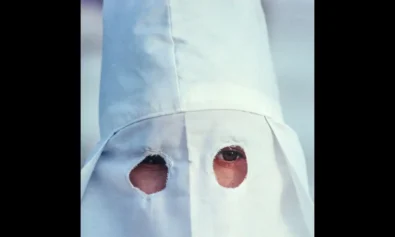A popular Black artist alleges he was racially profiled during his stay at one of New York City’s posh hotels. According to his lawyer, the creative was asked to leave his room by staffers who believed he was homeless because of the color of his skin — feeding into “the worst kind of racial stereotyping.”
Artist Kahlil Robert Irving hired a lawyer and filed an HRD complaint on Monday, Sept. 19, against the High Line Hotel at 180 10th Ave., alleging workers demanded he leave their premises because they thought he was homeless and illegally staying in a property room, according to Gothamist.
However, he was not.
Irving is an internationally recognized mix-media artist whose work has been included in exhibitions at the Whitney, New York’s New Museum, the Carnegie Museum of Art in Pittsburgh, the Danish Culture Center in Hungary, and other museums, galleries, and exhibitions around the globe. One of the St. Louis native’s latest works, “Projects: Kahlil Robert Irving,” was in an exhibition at MoMA at the time of the alleged discrimination.
The filing says he checked in on Thursday, Jan. 20, and on Saturday, Jan. 22 around 7:30 a.m. or 8 a.m. his civil rights were violated.
At that time, the hotel manager and associate “barged” into Irving’s room, racially profiled, and verbally assaulted him. The two employees, both white, came into the room because the door was cracked.
Once in the room, the manager asked Irving if he was doing OK, and left the room after the groggy guest said he was fine
According to his attorney, Laurence J. Eisenstein of the law firm Eisenstein Malanchuk LLP, his client was sleeping for about 30 to 40 minutes before he was disrupted by the hotel employees.
The complaints say the manager came back to his room, hovered over his bed while he slept, started “screaming” and using “abusive language.” Despite insisting he did not belong on the property and accusing Irving “of being a homeless person.”
They ordered the artist to leave — arguing with him for 15 to 20 minutes — until he pulled out his phone to show the staffers he was a paid guest.
Eisenstein asked, “They admitted he was a hotel guest. They never admitted they were wrong.”
Irving, according to Hyperallergic, said the incident was “highly traumatic” for him.
The complaint states the employees violated New York’s Human Rights Law, one that protects people from being discriminated against based on their specific protected classes. The law is applied to employment, housing, credit, non-sectarian educational institutions, and in this case places of public accommodations.
Irving’s attorney said because the hotel did not properly explain or apologize for the treatment, his client filed the complaint, adding, “Our patience just ran out.”
“It is impossible, except for racial animus, to imagine why the hotel manager would not have first called my room if there were questions or knocked politely to make a friendly inquiry,” the artist said, “instead of immediately taking a highly confrontational approach, choosing accusations over inquiry and immediately making aggressive threats without any provocations.”
According to Eisenstein, with his complaint, Irving is asking for the hotel to acknowledge the wrongful conduct of the staffers and for the hotel employees to be disciplined for their actions.
Irving wrote about the impact the experience had on him, saying, “To state the obvious: As a twenty-nine-year-old Black man, it was highly traumatic to be confronted by two older white men who barged into my hotel room unannounced while I was sleeping, screaming at me and saying that I needed to leave immediately and that the police were being called.”
He continued, “Can one seriously believe that this incident would have taken place and would have unfolded in such an aggressive and malicious manner, for any other reason, and absent hostile, racial stereotyping?”
After the altercation, the established artist reached out to his partners, who set him up at the hospital, at the Luhring Augustine Gallery. Those partners approached the owner-operator of the hotel, MCR Hotels, about the incident.
MCR Hotels, the development and management company responsible for High Line Hotel and — as it bills itself — the fourth-largest owner-operator in the United States, has not released a statement about the complaint.
The company did acknowledge the events of that night happened but does not believe it was racially motivated. MCR says it was a “misunderstanding.”
In fact, the hotel manager is still working at the High Line.
“How can you escape the conclusion that two white male hotel employees are engaging in racial stereotyping, assuming that a young Black male could not be a proper hotel guest,” Eisenstein said in a statement. “Can you imagine this incident happening to someone who is white?”
The company and hotel’s refusal to give credence to the incident surrounding Irving’s situation was the reason why he filed his claim.
“The filing is being done now because we had been attempting to initiate an informal dialogue with the hotel and its parent, to discuss these issues, however, they have been unwilling to engage in such a dialogue,” the lawyer said. “We reached the stage where we did not feel they would address the issues and concerns without our initiating some sort of legal proceeding.”
Irving added, “They never said this was a breach of protocol or this was unacceptable. It is and was completely out of line.”
According to Artnet.com, a Human Rights Division investigation into the complaint is most likely coming soon. If there is no settlement between the hotel and Irving, the case will be reviewed in a public hearing with an administrative law judge.
The judge will then recommend a resolution for the two partners to be engaged. Irving and his legal team are asking those bodies to consider both that the hotel workers receive better training, and that he is compensated monetarily.


